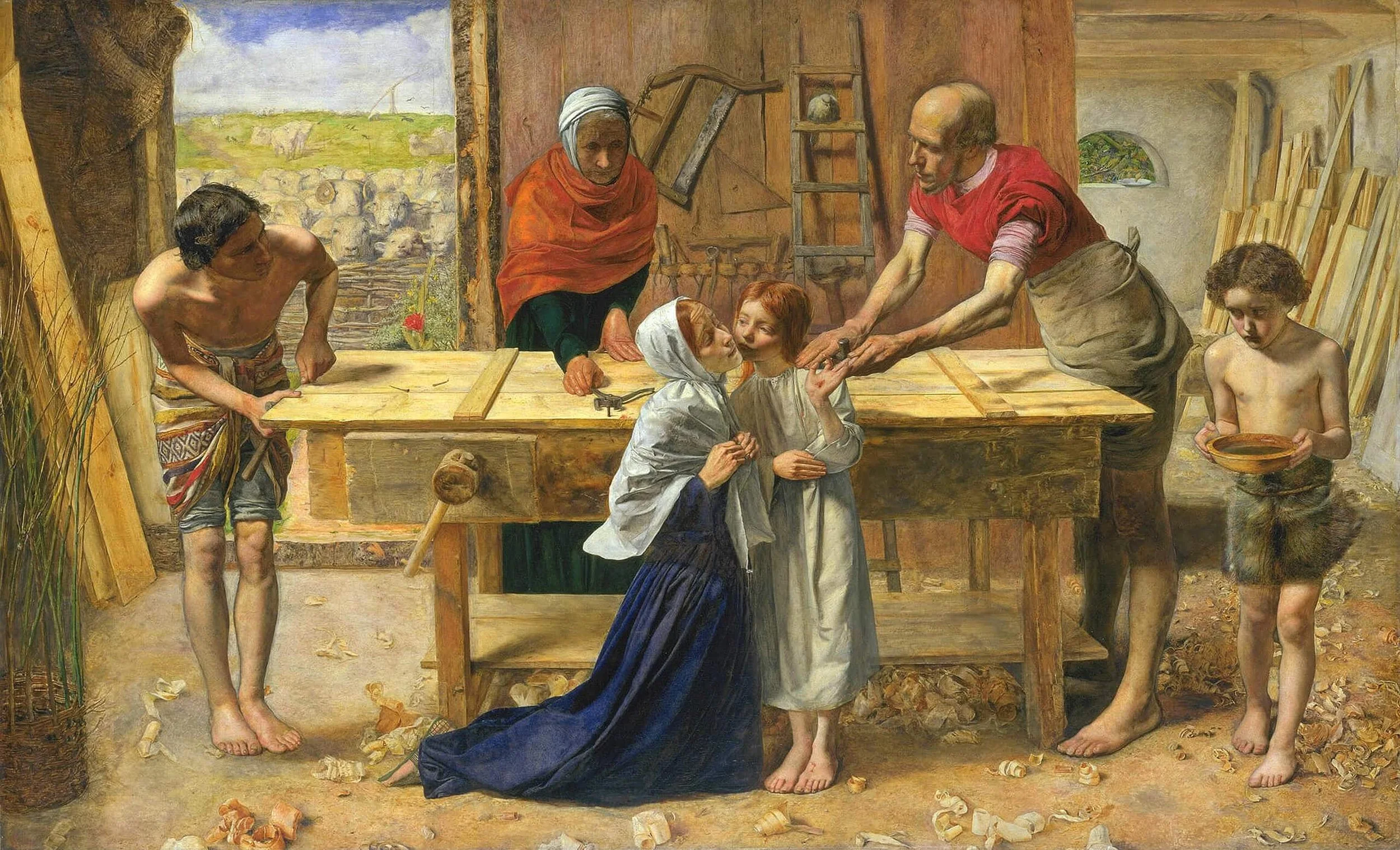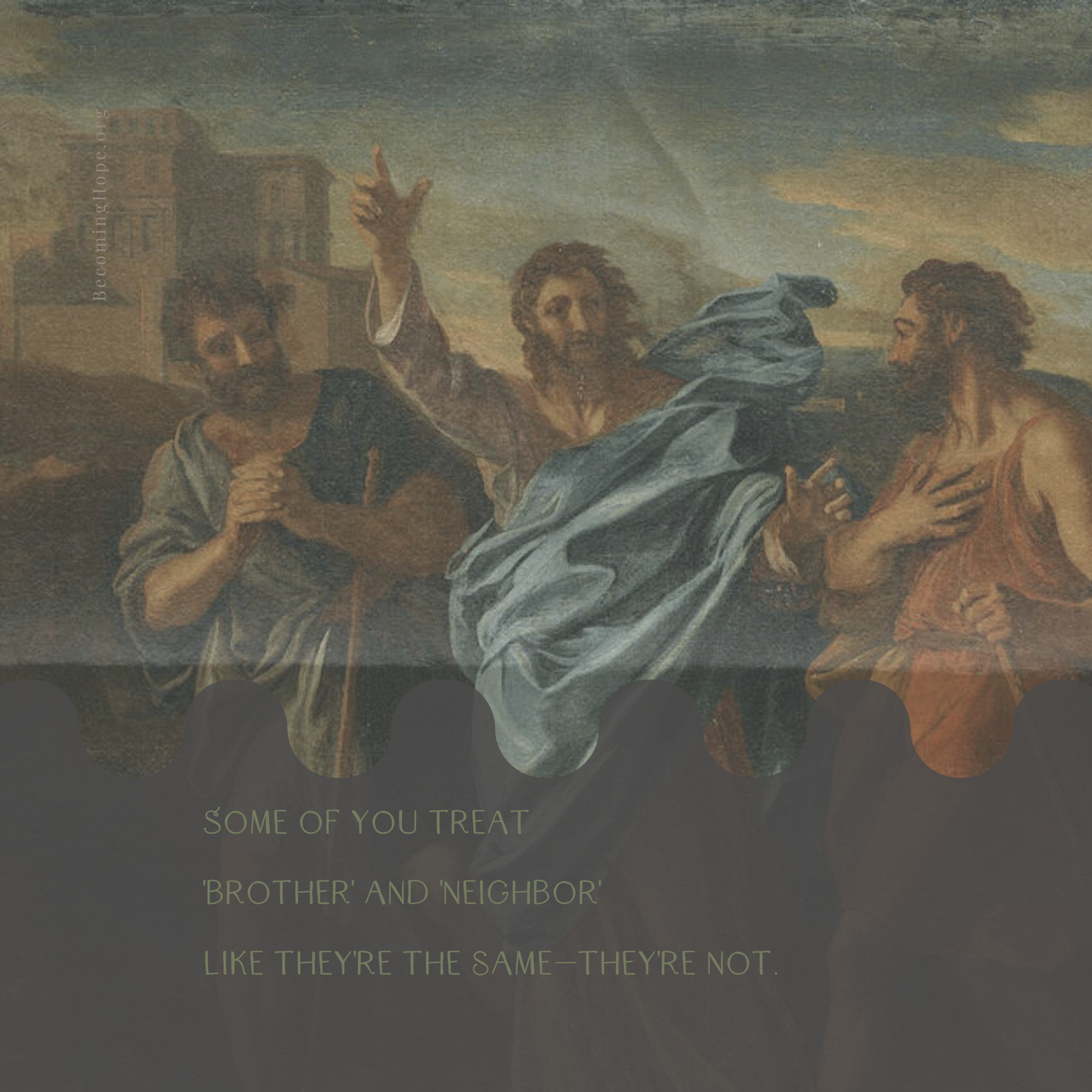Brother Versus Neighbor: Understanding Jesus’ Relationships
Bible StudyBrother Versus Neighbor
Understanding Jesus’ Relationships
Q: Why does it matter?
A: Many assume that loving a neighbor means treating everyone the same, but Jesus made clear distinctions. So, what is the difference between a brother and a neighbor, biblically speaking?
Jesus Loved His Neighbors But He Walked With His Brothers
Hebrews 2:11 (ESV) states, "For he who sanctifies and those who are sanctified all have one source. That is why he is not ashamed to call them brothers."
This verse beautifully captures the intimate relationship between Jesus and those He has redeemed. Jesus, the one who sanctifies, shares in our humanity, and because of His work, we are set apart to belong to Him. He bought us for a price.
“I am praying for them. I am not praying for the world but for those whom you have given me, for they are yours.”
The profound truth of Hebrews 2:11, is that Jesus, though fully divine, calls us brothers—a title that speaks of closeness, shared purpose, and love. He is not distant or removed but draws near, identifying with us in a deep, relational way.
This verse highlights the unity we have in Christ, not only as individuals saved by grace but as a family in the faith, all sanctified through Him. It’s a beautiful reminder that we are never alone; we are His—with Him, united under His sanctifying love.
“Christ in the House of His Parents" (1849–1850)
by John Everett Millais
Jesus’ ministry was filled with acts of love toward His neighbors. He healed the sick, dined with sinners, and showed compassion to those outside of His inner circle. Even so, His daily life was spent with His brothers—His disciples and those who did the will of His Father. He dwelled with His brothers, slept with His brothers, and walked from town to town, with His brothers. He lived his life with his brothers.
In John 15:15, Jesus tells them, “No longer do I call you servants, for the servant does not know what his master is doing; but I have called you friends, for all that I have heard from my Father I have made known to you.”
This was a privilege given to those who followed Him wholeheartedly, not to the crowds or religious leaders.
Jesus healed, prayed for, and showed mercy to neighbors, but He communed with His brothers.
Jesus Served His Brothers, Not the World
One of the clearest examples of this distinction is when Jesus washed the feet of His disciples (John 13:5-17). This was a humble act of service, yet, He did not extend it to the Pharisees, Sadducees, or unbelieving crowds. Instead, He washed the feet of those who were already walking in faith.
When Peter hesitated, Jesus told him, “If I do not wash you, you have no share with me” (John 13:8). This act symbolized spiritual cleansing and the humility required to follow Christ fully—something reserved for His brothers—not just anyone.
This principle extends to us today. While we are called to serve all people with love, the deepest acts of service—accountability, discipleship, and sacrificial love—belong within the body of Christ.
Our priority must be to build up and serve fellow believers, equipping one another to stand firm in faith.
High Priestly Prayer: John 17
“When Jesus had spoken these words, he lifted up his eyes to heaven, and said, “Father, the hour has come; glorify your Son that the Son may glorify you, since you have given him authority over all flesh, to give eternal life to all whom you have given him. And this is eternal life, that they know you, the only true God, and Jesus Christ whom you have sent. I glorified you on earth, having accomplished the work that you gave me to do. And now, Father, glorify me in your own presence with the glory that I had with you before the world existed.
“I have manifested your name to the people whom you gave me out of the world. Yours they were, and you gave them to me, and they have kept your word. Now they know that everything that you have given me is from you. For I have given them the words that you gave me, and they have received them and have come to know in truth that I came from you; and they have believed that you sent me. I am praying for them.
I am not praying for the world but for those whom you have given me, for they are yours.
All mine are yours, and yours are mine, and I am glorified in them.
And I am no longer in the world, but they are in the world, and I am coming to you. Holy Father, keep them in your name, which you have given me, that they may be one, even as we are one. While I was with them, I kept them in your name, which you have given me. I have guarded them, and not one of them has been lost except the son of destruction, that the Scripture might be fulfilled. But now I am coming to you, and these things I speak in the world, that they may have my joy fulfilled in themselves. I have given them your word, and the world has hated them because they are not of the world, just as I am not of the world. I do not ask that you take them out of the world, but that you keep them from the evil one. They are not of the world, just as I am not of the world. Sanctify them in the truth; your word is truth. As you sent me into the world, so I have sent them into the world. And for their sake I consecrate myself, that they also may be sanctified in truth.
“I do not ask for these only, but also for those who will believe in me through their word, that they may all be one, just as you, Father, are in me, and I in you, that they also may be in us, so that the world may believe that you have sent me. The glory that you have given me I have given to them, that they may be one even as we are one, I in them and you in me, that they may become perfectly one, so that the world may know that you sent me and loved them even as you loved me. Father, I desire that they also, whom you have given me, may be with me where I am, to see my glory that you have given me because you loved me before the foundation of the world. O righteous Father, even though the world does not know you, I know you, and these know that you have sent me. I made known to them your name, and I will continue to make it known, that the love with which you have loved me may be in them, and I in them.””
—John 17:1-26 (ESV)
Jesus Prayed for His Brothers, But for His Neighbors He Prayed Differently
In John 17, Jesus offers a powerful prayer before His crucifixion. He prays specifically for His brothers—His disciples and all who would believe in Him through their message. He states clearly in John 17:9, “I am not praying for the world but for those whom You have given Me, for they are Yours.” This shows that while Jesus loved all people, His intercessory prayer was focused on those who belonged to Him. Which means He intercedes only for those who belong to Him.
This does not mean we should not pray for unbelievers, in my opinion, because we have no idea who ends up as believer, or not. Jesus Himself prayed for those who crucified Him (Luke 23:34).
However, His deepest intercession was for His brothers, that they would be protected, sanctified, and united in truth. This teaches us that while we can and should pray for all people, our most fervent and intentional prayers should be for fellow believers, asking God to strengthen and uphold them in faith in the face of difficulties.
Who Is Your Brother? Who Is Your Neighbor?
Many people assume that everyone they interact with should be treated the same in terms of spiritual fellowship. However, the Bible makes it quite clear: while we are to love all people, our closest relationships should be with those who walk in faith.
God warns against being “unequally yoked” with unbelievers in Proverbs 13:20 He reminds us that, “Whoever walks with the wise becomes wise, but the companion of fools will suffer harm.”
A brother is someone who is in Christ, striving to live in obedience to God’s Word. A neighbor is someone we encounter in the world—someone we are called to love and witness to, but not necessarily someone we should walk closely with in spiritual matters. Understanding this difference helps us build relationships that glorify God while still showing love and kindness to the world, as we are commanded to do.
GRACE Method…
And Here We Find Grace…
GRACE perfectly encapsulates the transition from striving, to resting, in God's presence—which is at the heart of the message. Grace is the unmerited favor of God, and it's through His grace that we are able to move from struggle to peace. I invite you to pause and reflect on God's presence, how you can connect to God’s grace in a meaningful way.
Our GRACE Method™ is meant to encourage you so you can experience YHWH, Immanuel, and the Holy Spirit, in a deeper way, on a regular basis, through thought provoking Bible Study, Prayer, education, and Worship.
Application: How Should We Live?
Love your neighbors with mercy and kindness.
Walk with your brothers in fellowship and accountability.
Recognize the difference, just as Jesus did.
Grounding in Scripture
The Bible makes a clear distinction between brothers (those who are in Christ) and neighbors (those we are called to love but do not necessarily walk in fellowship with). Jesus loved all people, but He shared His life, ministry, and intimate teachings with His brothers. As believers, we must understand this distinction so we can build godly relationships and prioritize biblical fellowship.
Key Verse:
“For whoever does the will of my Father in heaven is my brother and sister and mother.” — Matthew 12:50 (ESV)
Key Verse:
“And he answered, “You shall love the Lord your God with all your heart and with all your soul and with all your strength and with all your mind, and your neighbor as yourself.” — Luke 10:27
How does Jesus’ distinction between loving His neighbors and walking with His brothers shape our relationships today?
Are you investing your closest time and energy into relationships that strengthen your faith?
How should this shape the way we prioritize service within the church and the broader world?
Reflecting on Context
In Jesus’ time, the religious leaders often saw themselves as His equals, but He did not consider them His brothers—instead, He corrected and rebuked them. Meanwhile, He washed His disciples’ feet and called them friends. What does this tell us about how Jesus defined true brotherhood? What cultural and biblical context helps us see why He made this distinction?
John 13:14 – Jesus washed His disciples’ feet, not the Pharisees’. He says to wash one another’s feet—not to wash everyone’s feet, not to wash the neighbor’s feet, but one another’s feet.
“If I then, your Lord and Teacher, have washed your feet, you also ought to wash one another’s feet.” —John 13:14
John 15:14-15 – Jesus calls His disciples friends, showing a personal relationship.
“You are my friends if you do what I command you. No longer do I call you servants, for the servant does not know what his master is doing; but I have called you friends, for all that I have heard from my Father I have made known to you.” —John 15:14-15
Matthew 26:26-28 – The Last Supper was only for His brothers.
“Now as they were eating, Jesus took bread, and after blessing it broke it and gave it to the disciples, and said, “Take, eat; this is my body.” And he took a cup, and when he had given thanks he gave it to them, saying, “Drink of it, all of you, for this is my blood of the(3) covenant, which is poured out for many for the forgiveness of sins.” —Matthew 26:26-28
While Jesus died for all, only His Friends participated in His body.
→ Reflection Questions:
Why did Jesus wash only His disciples’ feet and not those of the Pharisees?
How does Jesus’ prayer in John 17:9 show that He made a distinction between His brothers and the world?
Why did Jesus serve His disciples so intimately but not extend the same level of service to unbelievers?
Applying to Your Life
Understanding the distinction between a brother and a neighbor allows us to walk in wisdom. We are called to love all people, but biblical fellowship, accountability, and spiritual intimacy belong to those who share our faith. This affects friendships, marriage, mentorship, and even where we seek counsel.
Jesus loved the world but devoted His time, teaching, and deepest relationships to those who followed Him. As believers, we must do the same. We should show kindness to all but be intentional in our closest relationships, ensuring they point us toward Christ. By doing so, we not only grow in faith but also become a stronger witness to the world.
John 17:9 – “I am not praying for the world but for those whom you have given me.”
“This was to fulfill the word that he had spoken: “Of those whom you gave me I have lost not one.”—John 18:9 ESV
Luke 23:34 – Jesus prayed for the forgiveness of sinners (neighbors), but this wasn’t the same as His intercession for His disciples.
“And Jesus said, “Father, forgive them, for they know not what they do.” And they cast lots to divide his garments.”—Luke 23:34 ESV
Galatians 6:10 – “Let us do good to everyone, and especially to those who are of the household of faith.”
“So then, as we have opportunity, let us do good to everyone, and especially to those who are of the household of faith.” —Galatians 6:10
1 John 3:14 – “We know that we have passed out of death into life, because we love the brothers.”
“We know that we have passed out of death into life, because we love the brothers. Whoever does not love abides in death.” —1 John 3:14
→ Reflection Questions:
Are there any relationships in your life that need to be adjusted in light of this study? How can you prioritize biblical fellowship while still loving your neighbors as Jesus did?
In your own life, do you treat all relationships the same, or do you prioritize fellowship with believers?
How does understanding the difference between a brother and a neighbor help you build stronger faith-based friendships?
How does Jesus’ high priestly prayer reveal His priorities in intercession?
How can we model this in our own prayer lives, praying for both believers and unbelievers in the way Scripture teaches?
Based on Scripture, how do you determine whether someone is a spiritual brother or simply a neighbor?
How can you show Christ’s love to your neighbors without compromising your walk with your fellow believers (brothers) and Jesus Christ?
Communing with God
Lord, thank You for the wisdom in Your Word. Help me to love my neighbors with kindness and compassion while building my deepest relationships with those who walk in faith. Give me discernment in friendships, guidance in my commitments, and a heart that honors You in all things. Help me build godly relationships that strengthen my walk with You, just as Jesus did with His Apostles and disciples.
In Jesus Name, Amen + Amen!
Exalting God
Worship Him for the gift of spiritual family. Take time to listen to one of the worship songs in this study, and reflect on how God has placed brothers and sisters in your life to walk with you in faith.
More On The Blog…
Fuel the Mission – Just like a warm cup of coffee fuels the body, your support fuels our mission to share God’s Word with the world. Every contribution helps cover the costs of running this ministry—keeping Bible study resources, articles, and printables free for everyone, regardless of income or resources. Your generosity allows us to continue creating faith-filled content, ensuring that no one is hindered from deepening their walk with Christ. If you’ve been blessed by what you’ve found here, consider helping us fuel the mission so we can keep spreading His truth far and wide.




In the opening chapter of Esther, we meet two distinct groups who surround the king: the seven eunuchs who carry out his commands, and the seven princes who hold authority and advise him. But their names, like secret messengers, tell a deeper story.